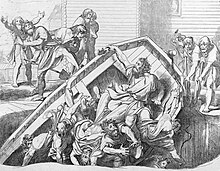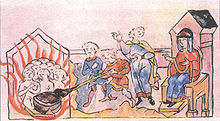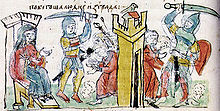Draft:Olga's Revenge on the Drevlians
 | Draft article not currently submitted for review.
This is a draft Articles for creation (AfC) submission. It is not currently pending review. While there are no deadlines, abandoned drafts may be deleted after six months. To edit the draft click on the "Edit" tab at the top of the window. To be accepted, a draft should:
It is strongly discouraged to write about yourself, your business or employer. If you do so, you must declare it. Where to get help
How to improve a draft
You can also browse Wikipedia:Featured articles and Wikipedia:Good articles to find examples of Wikipedia's best writing on topics similar to your proposed article. Improving your odds of a speedy review To improve your odds of a faster review, tag your draft with relevant WikiProject tags using the button below. This will let reviewers know a new draft has been submitted in their area of interest. For instance, if you wrote about a female astronomer, you would want to add the Biography, Astronomy, and Women scientists tags. Editor resources
Last edited by TimothyBlue (talk | contribs) 2 months ago. (Update) |
This article includes a list of general references, but it lacks sufficient corresponding inline citations. (January 2024) |

Olga's Revenge on the Drevlians — a chronicle legend describing an event that allegedly occurred during the reign of Olga and described by monks of the Kiev-Pechersk monastery (presumably under the leadership of Nestor) in the Tale of Bygone Years.
Background[edit]
After the Drevlyans killed prince Igor in 945, Olga became the princess of Kiev, because at the time of Igor's death their son Svyatoslav was still too young to rule. Having become the head of the state, Olga decided to avenge her husband's death and to force the Drevlyans into submission.[1]
First Revenge[edit]

After Ihor's murder, the Drevlyans sent 20 "best men" to Olha, deciding to woo her to their prince Mal. The ambassadors sailed to Kyiv by boat along the Dnipro River and docked near Borychiv. Olha pretended to accept the offer of the villagers and, as if to honour the ambassadors, ordered her subjects to solemnly carry them on boats to her palace. Meanwhile, a pit had already been dug in the courtyard, and the ambassadors were thrown into it by Olga's order. Then Olga came down from the palace and asked them, leaning over the pit, "Are you honoured?", to which the villagers replied: "Worse is our death than Igor's". Then the princess ordered them to be buried alive.
Second Revenge[edit]

The second time, Oga asked for the best men to be sent to her. Then the drevlians sent the most noble men to Kyiv - princes, merchants, and boyars. When they arrived at Olha's house, she ordered them to heat a bath for the ambassadors. And so they did. And when the ambassadors were washing, the princess ordered the bathhouse to be set on fire, and everyone burned to death in it.
Third Revenge[edit]

Olha's third revenge was not without its tricks. The Kyivan army was already ready to march on the land of Derevliansk. Again, Olga addressed the villagers with the words: "I am coming to you. So prepare a lot of honey in the city where my husband was killed. Let me weep over his coffin and hold a funeral service for my husband." Olha and her small team set off on their journey. Near the town of Iskorosten, at her husband's grave, she ordered a huge mound to be filled and a funeral service to be held. The villagers drank, and Olga's boys served them. The villagers asked Olga: "Where are our matchmakers, whom we sent to you?" She replied that they were coming here with the Kyivan wife. In pagan times, at a funeral feast, people not only drank, but also organised competitions and war games. In Christian times, this ancient custom of fighting to commemorate the dead drew criticism from the church, which was reflected in confessional questions ("did you fight over the dead?"). Olga decided to use this ancient custom for revenge. When the villagers got drunk, the princess first ordered her boys to drink for them and then kill them. And they killed five thousand of them.
Fourth Revenge[edit]

In 946, Olha marched with her army against the Drevlyans. A large army of Drevlyans opposed the Kyivans. The army of Kyiv besieged the main town of the Drevlyans, Iskorosten, whose inhabitants killed Igor. They steadfastly defended themselves, because they knew well that they would not be spared. This siege lasted for a year, but the army could not capture the city. Then Olha sent ambassadors to the Drevlyans with the following words: "What do you want to do? Or do you want to starve to death, refusing to accept tribute? Your cities have already been taken, and people have long been cultivating their fields." The townspeople replied: "We would be happy to pay tribute, but you want to take revenge for your husband who died." Olga said: "I have already avenged my husband when you came to Kyiv, and the second and third time when you performed a memorial service for my husband. Therefore, I will not seek revenge anymore, but I want to take a little tribute and, having made peace with you, I will go back." The villagers asked: "What do you want to take from us? We will gladly give you honey and furs." She replied: "You have neither honey nor fur at the moment. I need only a little from you: give me three pigeons and three sparrows from each household. For I do not want to lay a heavy tribute on you, as my husband did, but I ask you a little. For you are tired under siege, so give me this little." The drevlians agreed. They gathered three pigeons and sparrows from each household and sent them to the princess with a bow. The fact that she demanded such an easy tribute did not raise any suspicion in them. After all, it had long been the custom of the Eastern Slavs to sacrifice birds to the gods. That, they thought, was why the princess needed such a tribute. In the meantime, Olha gave her soldiers pigeons and sparrows and ordered them to tie a drone to each one, and when it got dark, to set the drone on fire and let the birds fly free. They did just that. The pigeons flew to their dovecotes and the sparrows flew to the roofs. And Iskorosten burst into flames from all sides at the same time. There was not a single yard where it was not burning, and it was impossible to put it out because it was burning from all sides. Then people fled from the city, and Olha ordered the soldiers to catch them: to kill some and take others prisoner. So the princess took the city by trickery, burned its elders, beat many people, sold some into slavery, and forced the rest to pay heavy tribute. This is how the chronicler Nestor in his Tale of Bygone Years described the beginning of Olha's reign and her revenge on the Drevlyans.
References[edit]
- ^ Школьник Ю. К. (2013). История России. Полная энциклопедия. Moscow: ЭКСМО. p. 18. ISBN 9785457365933.
Literature[edit]
- Коптев А. Летописная месть княгини Ольги древлянам и ритуал погребения русского князя // Centaurus: Studia classica et mediaevalia, vol. 4. М., 2008. С. 116–148.
- Козлов М. М. Легенда про помсту княгині Ольги: факти проти міфів // Наукові праці. Політичні науки [Текст]: науково-методичний журнал. — Миколаїв: Видавництво МДГУ ім. Петра Могили, 2002. — Вип. 10, т. 23.
- Грушевський М. Ілюстрована історія України. 1921. Скан стор. 70.
Links[edit]
